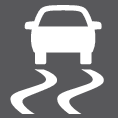
A pulsating sound will be audible when the system is actively operating and is normal. Acceleration will also be slightly slower than normal.
Warning
ESC is a supplementary aid and cannot deal with all situations or road conditions.
The driver is always responsible for operating the vehicle in a safe manner in accordance with current traffic regulations.
ESC consists of the following functions:
- Traction control
- Spin control
- Active Yaw Control
- Engine Drag Control
- Corner Traction Control
Traction Control (TC)
This function is designed to help reduce wheel spin at low speeds by transferring power from a drive wheel that begins to lose traction to the wheel on the opposite side of the vehicle (on the same axle).
Spin Control (SC)
The SC function is designed to help prevent the drive wheels from spinning while the vehicle is accelerating.
Active Yaw Control (AYC)
This function helps maintain directional stability, for example when cornering, by braking one or more of the wheels if the vehicle shows a tendency to skid or slide laterally.
Corner Traction Control (CTC)
CTC compensates for understeering and helps provide additional stability when accelerating through a curve by preventing the inside wheel from spinning. This is particularly useful when accelerating on a curving highway on-ramp.
CTC is most effective if the stability system's Sport mode is selected. See the section about Sport mode.
Engine Drag Control (EDC)
EDC helps keep the engine running if the wheels show a tendency to lock, e.g., when shifting down in the Geartronic manual shifting mode or while using the engine's braking function on a slippery surface. If the engine were to stop, power steering would not function, making the vehicle more difficult to steer.
Trailer Stability Assist (TSA)
The TSA helps stabilize a vehicle that is towing a trailer when the vehicle and trailer have begun to sway. See Trailer Stability Assist (TSA) for more information.
This system is automatically deactivated if the driver selects Sport mode.